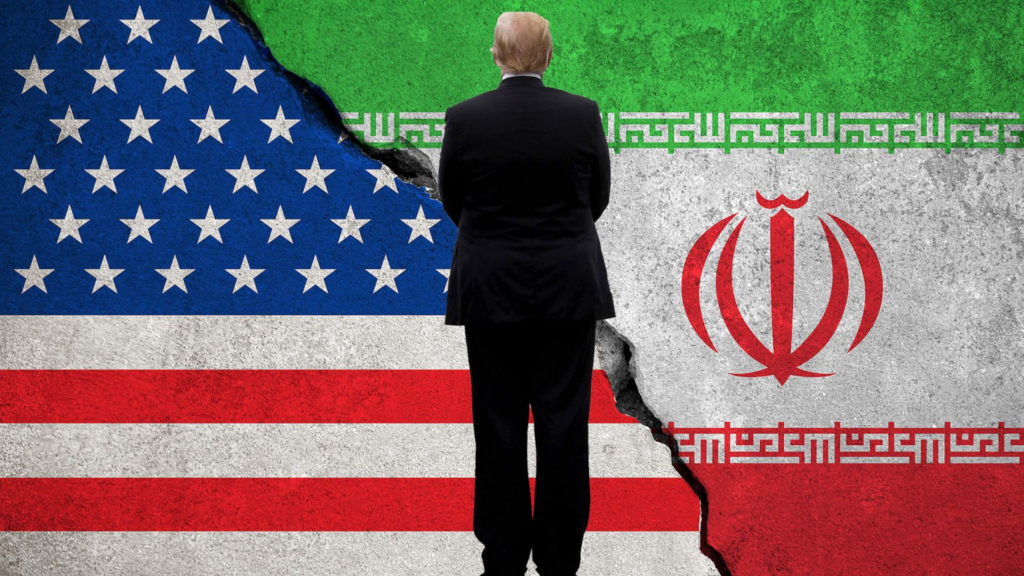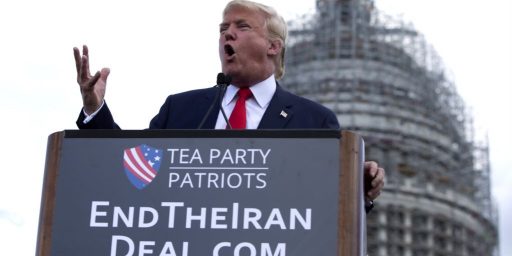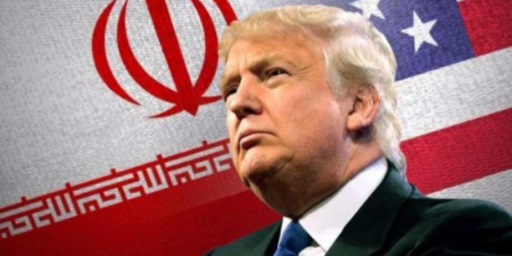Tensions Increasing Amid Talk Of Military Action Against Iran
Tensions are increasing in the Persian Gulf as the Iran war hawks seem to be winning the battle for the President's support.

Tensions are escalating in the Persian Gulf between the United States and Iran, and it’s getting harder and harder to tell where things are headed. It began last week with attacks on two tankers bound for Asia which first the Saudis and now the Pentagon have blamed on Iran generally and on the naval forces of the Islamic Republic’s Revolutionary Guard specifically. Iran has officially denied any responsibility for the attacks, though. Yesterday, the looming crisis seemed to enter a new phase, with Iran threatening to exceed an important constraint put in place by the nuclear deal it signed four years ago and the United States upping the military ante:
Tensions between the United States and Iran flared on Monday as Tehran said it would soon breach a key element of the 2015 international pact limiting its nuclear program, while President Trump ordered another 1,000 troops to the Middle East and vowed again that Iran would not be allowed to develop a nuclear weapon.
The Pentagon’s announcement of the troop deployment came three days after attacks on two oil tankers in the Gulf of Oman that the administration has blamed Iran for. And it came hours after Iran said it was within days of violating a central element of the landmark 2015 agreement — intended to curb its ability to develop a nuclear weapon — unless European nations agreed to help it blunt crippling American economic sanctions.
Iran’s Atomic Energy Organization said that within 10 days the country will have produced and kept in its stockpiles more low-enriched uranium — the sort used to fuel power plants — than allowed by the 2015 containment deal. The agency also left open the possibility that it might soon begin enriching the uranium to higher levels of purity, edging it closer to what would be necessary to build a nuclear weapon.
Mr. Trump pulled out of the 2015 pact last year, saying that it was not tough enough on Iran. In doing so, he put intense strain on the international coalition that had backed the agreement and wanted to keep it alive. And he left Iran trapped between continuing to abide by the deal’s provisions without getting any of its benefits or abandoning it and provoking a more intense conflict with the United States.
With Iran now on the verge of breaching the deal, the White House called for greater international pressure on the country, even as European officials urged restraint between the two longtime adversaries.
“President Trump has made it clear he will never allow Iran to develop nuclear weapons,” the National Security Council said in a statement.
The additional 1,000 troops being sent to the region comes on top of 1,500 dispatched in May. They will be used mainly for surveillance of Iranian activities and protecting American forces already in the Middle East. The Pentagon had considered plans for deployment of up to 6,000 additional troops.
“The recent Iranian attacks validate the reliable, credible intelligence we have received on hostile behavior by Iranian forces and their proxy groups that threaten United States personnel and interests across the region,” the acting defense secretary, Patrick Shanahan, said in a statement.
The announcement from Tehran was Iran’s latest signal that it would abandon the 2015 pact unless other signatories help it offset economic sanctions imposed by Mr. Trump. The threat seemed aimed primarily at European countries to persuade them to break with Washington and restore to Tehran some of the economic benefits of the deal.
Iran had been abiding by the terms of the nuclear deal, negotiated under President Barack Obama, before Mr. Trump pulled out, and has continued to do so since the withdrawal by the United States. But as American sanctions have squeezed the Iranian economy, Tehran has warned that it could not remain in the deal without getting European help to find workarounds to the sanctions.
“This was an entirely predictable consequence of the Trump administration’s withdrawal from the nuclear deal and maximum pressure strategy,” said Ali Vaez, the director of the Iran project at the International Crisis Group, a conflict-resolution organization. “In practice, maximum pressure has produced maximum peril and minimum strategic results.”
The mechanism of American sanctions may actually have sped Iran to the point where its stockpile of uranium is on the verge of violating the 2015 agreement’s terms. In May, the State Department announced that it might penalize countries that transfer enriched uranium out of Iran.
Until now, Iran has shipped most of the low-enriched uranium it produces out of the country, swapping it for natural uranium. That allows it to continue producing small amounts of nuclear fuel for civilian power plants without building up a stockpile for potential use in weapons.During a news conference announcing Tehran’s decision, Behrouz Kamalvandi, a spokesman for Iran’s Atomic Energy Organization, said Iran might also enrich its uranium up to 20 percent purity for use in reactors, the Iranian state-run news organization Press TV reported.
This latest action by Iran comes roughly one year after President Trump announced that the United States was pulling out of the Joint Comprehensive Plan of Action (JCPOA), the nuclear weapons deal reached between Iran and a group of seven nations that include the United States, France, Germany, Russia, and China. Despite that move, Iran, which by all accounts had been abiding by the terms of the agreement. None of the parties to the agreement joined the United States in withdrawing from the agreement, though, and Iran stated at the time that it intended to keep abiding by its obligations.
As time has gone on, though, the United States has upped the pressure on the Islamic Republic by beginning to reimpose the sanctions that had been lifted as part of the deal. This has included measures that have discouraged many major multi-national corporations from doing business in or with Iran. Shortly after that, the U.S. took measures to cut off the Islamic Republic’s ability to access the revenues generated by oil exports that form a substantial part of its economy. By all accounts, these reimposed sanctions have had a serious impact on the Iranian economy in general and on the value of its currency specifically. They have also led to shortages of medicine in the country despite American promises that humanitarian and other emergency aid would not be impacted by sanctions. ”
In addition to this, the Administration has taken steps that have arguably led to an increased possibility of a military clash in the Persian Gulf that could spiral out of control. In April, for example, the President officially designated the Iranian Revolutionary Guard as a terrorist organization notwithstanding warnings from advisers that doing so could lead to increased tensions in the area and reprisals against Americans by Iranian agents of proxies such as Hezbollah or other terrorist groups in the Middle East. Last month, amid vague reports of a rising Iranian threat that the Administration declined to set forth in detail, the Administration announced that the USS Abraham Lincoln and its battle group would be headed to the region, and also sent 1,500 troops to the region. Yesterday’s announcement of 1,000 more troops would add to that total, although its worth noting that most of these forces appear to consist of intelligence and support personnel rather than actual combat troops.
On top of all of this, rumors are swirling that things are about to get far more serious. Responding to Iran’s latest threats to exceed the limitations of the JCPOA, the Trump Administration has accused the regime of engaging in “nuclear blackmail.”:
WASHINGTON (Reuters) – Iran’s plan to exceed internationally agreed curbs on its stock of low-enriched uranium amount to “nuclear blackmail” and must be met with increased international pressure, a White House National Security Council spokesman said on Monday.
“Iran’s enrichment plans are only possible because the horrible nuclear deal left their capabilities intact,” NSC spokesman Garrett Marquis said. “President Trump has made it clear that he will never allow Iran to develop nuclear weapons. The regime’s nuclear blackmail must be met with increased international pressure.”
The security council’s comments followed Tehran’s announcement on Monday that it would breach the curbs set in the 2015 Iran nuclear deal in 10 days.
As Daniel Larison notes in a post yesterday, this is an absurd proposition given the fact that Iran does not have nuclear weapons and that it would likely take several years for the nation to develop a bomb even if it broke out of the JCPOA today. Indeed, as Larison notes in his post, pulling out of the JCPOA and reimposing sanctions when there was no factual basis for doing so leaves Iran with few choices other than breaking out of the agreement itself. Arguably, this is exactly what hardliners in the United States who have been pushing for military action against the Islamic Republic for years and who opposed the JCPOA and the very idea of negotiations want to see happen. For years, these people have been looking for a pretext for war with Iran, often with the willing encouragement of outside forces such as Israeli Prime Minister Benjamin Netanyahu. Now, it seems as though we’re one step closer to them getting exactly what they want.
The Jerusalem Post, meanwhile, has a report that the U.S. is preparing an attack on Iranian nuclear research facilities:
Diplomatic sources at the UN headquarters in New York revealed to Maariv that they are assessing the United States’ plans to carry out a tactical assault on Iran in response to the tanker attack in the Persian Gulf on Thursday.
According to the officials, since Friday, the White House has been holding incessant discussions involving senior military commanders, Pentagon representatives and advisers to President Donald Trump.
The military action under consideration would be an aerial bombardment of an Iranian facility linked to its nuclear program, the officials further claimed.
“The bombing will be massive but will be limited to a specific target,” said a Western diplomat.
The decision to carry out military action against Iran was discussed in the White House before the latest report that Iran might increase the level of uranium enrichment.
The officials also noted that the United States plans to reinforce its military presence in the Middle East, and in the coming days will also send additional soldiers to the area.
The sources added that President Trump himself was not enthusiastic about a military move against Iran, but lost his patience on the matter and would grant Secretary of State Mike Pompeo, who is pushing for action, what he wants.
Commenting a separate post on this report, Daniel Larison notes that if it is true then it means that the worst of the Iran hawks are winning the argument:
If this report is true, that would mean that the worst of the Iran hawks in the administration are prevailing once again. The report goes on to say that “Trump himself was not enthusiastic about a military move against Iran, but lost his patience on the matter and would grant Secretary of State Mike Pompeo, who is pushing for action, what he wants.” If that is true, that is an absurdly casual way to blunder into an unnecessary war.
Trump should understand that if he takes the U.S. into a war against Iran, especially without Congressional authorization, it will consume the rest of his presidency and it should cost him his re-election. Starting an unnecessary war with Iran would go down as one of the dumbest, most reckless, illegal acts in the history of U.S. foreign policy.
(…)
The risk of war with Iran is greater than it was six months ago, and it is much greater than it was two and a half years ago when Trump took office. The U.S. and Iran are in this dangerous position solely because of the determined efforts of Iran hawks in and around this administration to drive our country on a collision course with theirs. Those efforts accelerated significantly thirteen months ago with the U.S. withdrawal from the JCPOA and the reimposition of sanctions, and things have been getting steadily worse with each passing month. It is not too late to avert the collision, but it requires the U.S. to make a dramatic change in policy very soon. Since we know we can’t count on the president to make the right decision, Congress and the public need to make him understand what the political price will be if he makes the wrong one.
The Trump Administration has taken no steps to seek Congressional authorization for any action against Iran, which would seem to clearly be necessary. Additionally, the President seems to have set aside his alleged non-interventionist tendencies in this case, something that was seemingly inevitable given the advisers he now has around him. Past members of his circle of advisers, such as former Chief of Staff John Kelly, former National Security Adviser H.R McMaster, former Defense Secretary James Mattis, and even former Secretary of State Rex Tillerson were once seen as something as a bulwark against whatever instincts the President may have had to lash out in a military fashion. Those men are now gone, and the men who have replaced them, specifically including Bolton and Pompeo, are believed to be pushing him toward military action. What happens if they win that argument is anyone’s guess but it likely won’t end well.






For everybody but them, they won’t suffer any consequences beyond possibly losing an election.
Given that any serious attack by the US on Iran will probably result in the Straits of Hormuz being rendered impassable to shipping….with corresponding effects on oil prices…
Wonder how Trump will like having to deal with a US economy and stock markets that have been suddenly slammed with $200/bbl oil prices. Knowing him, he’ll probably rage that it’s all “fake news!” and insist that it’s all made up.
Stupidity should hurt. Especially stupidity which depends on ignoring reality. We, like the Brits, are about to re-learn this lesson the hard way.
The president needs to keep the back channel communication lines open. Maybe bring in someone like Sec. Kerry, General Petraeus, or General Gates to communicate, probe, and see what can be worked out. Not all of Iran’s leaders are nuts.
@Tyrell:
The problem is everybody in this admin is.
ETA: also, we already had something worked out.
Dennison is an historically unpopular president to begin with, and is suffering in the polls. It was always the plan to start a war with Iran. Why else would you appoint Bolton?
Part of Dennison’s psychosis is to project everything. From November, 2011:
@grumpy realist:
Easy. Oil that high would boost the value of the peso, and then Mexicans would buy yuge amounts of US goods (sure), offsetting the trade deficit (yeah, right) and ending illegal immigration in one swift stroke (I’ve a bridge I could be persuaded to sell).
Strongly disagree. Trump’s decision to appoint Bolton can be entirely explained by the fact that Bolton went on TV and acted like a big tough badass. That makes way more sense to me than the idea that for the first time Trump envisioned and carried out a strategy. Furthermore Trump said that the decision to invade Iraq was the biggest mistake in US history–I know he did so after the fact, I’m talking about his current state of mind–making it more unlikely that he’s deliberately planning for an even worse war.
@Teve:
He’s not planning. Bolton and Pompeo are. Part of their strategy would be to play Dennison. You know, like “The war on Iraq failed because we no one with your abilities and leadership in command at the time.” He already thinks that way. The JCPOA was no good because he could have done it better. Those damned Iranians are just trying to get him to fail, then make the exact same deal with a Democrat. Oh, but we won’t let them get away with that. Oh, no. They’ll have to pay!
As I have said many times before I think that going to war with Iran would be a serious error. Iran is more populous, wealthier, and culturally different from Somalia, Iraq, Libya, or Syria. War with Iran would crystallize support for the despicable Iranian regime.
There is no benefit to the U. S. in going to war with Iran. If the Iranians close the Straits of Hormuz not only would it be suicide for them, it might actually benefit us.
As my dear husband says … “It’s about time we get in there and clean the place up, just like we did in Iraq.”
We have reached the point as a nation where commentor Tyrell makes more sense than the President of the United States. Tyrell, I mean this comment respectfully.
Meanwhile the price of petroleum on the world exchange has not exceeded $53.00/bbl. The Trump announcements and bluster have not brought one bead of sweat to the brows of the world’s oil traders. If he does in fact blow up something in Iran it will probably be the biggest shock to world business since — when did Atlantis sink?
@Dave Schuler: Iran unlike all those other places listed has an extensive array of anti-ship and anti-air missiles with the proper infrastructure to use them. Our carrier fleets are impressive in blue water but they have to move into the gulf of Oman to hit Iran. For an idea of how bad that can go for the USA I would suggest you look up the Millennium Challenge 2002. The opponent of the USA was designated as an unknown adversary in the middle east but it was commonly known that red team was a stand in for Iran. Blue team was the USA.
https://en.wikipedia.org/wiki/Millennium_Challenge_2002
TLDR : Using basic technology available to Iran Lieutenant General Paul K. Van Riper was able to destroy 16 warships including the carrier with just one volley of anti-ship missiles. The wave of small attack boats following the missile strike sunk a significant amount of those ships left floating. Basically in one day most of the US fleet was sunk. At that point Blue team was unable to do anything effective and the entire exercise was restarted with new rules designed for blue team to win.
@Kathy: If your bridge is in Nueva Laredo, you may be able to sell it to the current administration. I hear that they would like to have more control over bridge traffic there.
@Dave Schuler: Well certainly, all of that is true, but what does any of it have to do with what Trump, Pompeo, and Bolton (the 3 Stooges of foreign policy?) might decide to do?